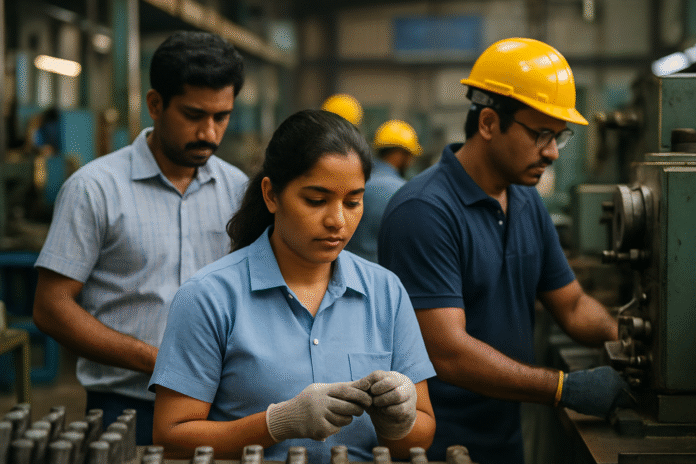Small and Medium Businesses in India Remain Optimistic About Q1 FY26: Services Sector Unfazed by US Tariff Threats
In the dynamic world of Indian micro, small, and medium enterprises (MSMEs), optimism remains strong as businesses look ahead to the first quarter of fiscal year 2026 (April–June 2025, or Q1 FY26). According to the third MSME Outlook Survey conducted by the Small Industries Development Bank of India (SIDBI), a significant majority were upbeat about their immediate prospects. Notably, firms in the services sector remained largely unfazed by potential US tariff increases on Indian exports—though somewhat more manufacturing players expressed concern.
A Positive Business Climate: Confidence Index on the Rise
The Composite MSME Business Confidence Index (M-BCI), which reflects firms’ sentiment about current conditions, rose from 60.82 in Q4 FY25 to 63.75 in Q1 FY26 (on a 0–100 scale, with readings above 50 indicating positive sentiment). This illustrates a noticeable uplift in general confidence across the MSME landscape. SIDBI’s press summary attributes this rise to improving domestic demand and a friendlier financial environment.
The Business Expectations Index (M-BEI), which captures outlook over upcoming periods, was recorded at 62.19 for the July–September quarter (Q2 FY26) and 67.88 for Q1 FY27. These elevated forward-looking readings signal sustained optimism, especially for the longer horizon.
Sales Growth: Manufacturing, Trading, and Service Sectors Performing Strongly
Sales growth was widespread in Q1 FY26:
- Over 50% of MSMEs in both manufacturing and trading sectors reported increased sales.
- In the services sector, 42% of MSMEs saw sales increase, while 48% reported stable performance.
- Year-on-year, firms across all sectors reported growth, with around 60% expecting further gains in a year’s time.
This broad-based momentum across sectors underscores the resilience of domestic demand and adaptability of MSMEs.
Services Sector Remains Resilient Amidst Tariff Fears
The survey was conducted before the US President’s tariff enforcement on Indian goods. Interestingly, services-sector firms did not view these US tariff hikes as a concern, signaling confidence in their business model and market dynamics.
In contrast, a smaller segment of manufacturing enterprises voiced caution. Nearly 40% of MSME exporters—concentrated largely in manufacturing—reported being directly or indirectly impacted by tariff-related challenges. This divergence highlights potential vulnerabilities in export-dependent manufacturing, while domestic-oriented services remained largely insulated.
Financial Conditions Improving: Access to Credit and Rates
On the financing front, conditions showed marked improvement:
- 88% of respondents reported better access to overall finance, up sharply from 79% in the previous survey.
- Fewer firms observed rising borrowing costs—a sign of the transmission of the Reserve Bank of India’s 100 basis point repo-rate cut since February 2025.
These developments indicate greater liquidity and easing financial burdens, particularly important for capital-constrained MSMEs.
Operational Metrics: Profitability, Capacity, Skilled Labour
Operational indicators painted a robust picture:
- Profit margins improved across sectors despite persistent input cost pressures.
- Capacity utilisation rose—about 21% of manufacturing and 20% of services enterprises were operating above normal capacity, up from just 12–14% previously.
- The availability of skilled labour improved, with nearly one-fourth of MSMEs reporting better access to talent.
These indicators reflect enhanced productivity, efficiency, and stabilizing workforce dynamics.
Emerging Risks and Uncertainties: Near-Term Caution
Some caution is warranted in near-term projections:
- The M-BEI dipped slightly for Q2 FY26 amid evolving global economic uncertainties and tariff volatility.
- A subset of MSME exporters expressed concern about the trajectory of global trade tensions, although long-term expectations remained solid.
Summary Table: Key Findings from SIDBI’s Q1 FY26 Survey
| Metric | Q1 FY26 | Previous Quarter | Trend / Insight |
|---|---|---|---|
| M-BCI (Current Confidence) | 63.75 | 60.82 | Positive sentiment improving across sectors |
| M-BEI (Next Qtr) | 62.19 | — | Strong short-term outlook |
| M-BEI (Q1 FY27) | 67.88 | — | Even greater confidence in long-term prospects |
| Manufacturing Sales↑ | >50% (increase) | — | Strong demand and performance |
| Services Sales↑ | 42% increased, 48% stable | — | Solid core resilience |
| Exporters Impacted by Tariffs | ~40% | — | Export-sensitive firms showing concern |
| Access to Finance Improved | 88% firms | 79% | Greater liquidity and support |
| Borrowing Cost Trends | Decline in pressure | — | Repo-rate cut impact visible |
| Capacity Utilisation↑ | ~20% operating above capacity | ~12–14% | Rising demand and efficiency |
| Skilled Labour Availability | ~25% firms better access | — | Talent supply easing |
| Profit Margins | Improved despite cost pressure | — | Robust operational management |
| Near-Term Outlook (Q2) | Slight dip indicated | — | Global uncertainties prompting caution |
| Long-Term Outlook (Q1 FY27) | Strong at ~67–68 | — | Enduring confidence in business resilience |
Final Reflections: Resilience Amid Challenge
SIDBI’s latest MSME Outlook Survey (Round 3, April–June 2025) delivers a clear signal: Indian MSMEs, especially in the services and domestic-focused manufacturing segments, are entering Q1 FY26 with confidence. With improving access to finance, easing lending costs, healthier demand, and operational efficiencies, the sector is poised to navigate external headwinds.
However, tariff-related disruptions especially affecting exporters—combined with global uncertainties—present areas requiring vigilance and policy attention. Continued supportive measures from financial institutions and government bodies can bolster this resilient sector.



